Shell, the other U.K. “super-major” oil company, also re-entered Iraq in 2009 after an invasion in 2003 that was widely denounced at the time as a war-for-oil on the part of the U.S. and U.K., Matt Kennard reports.
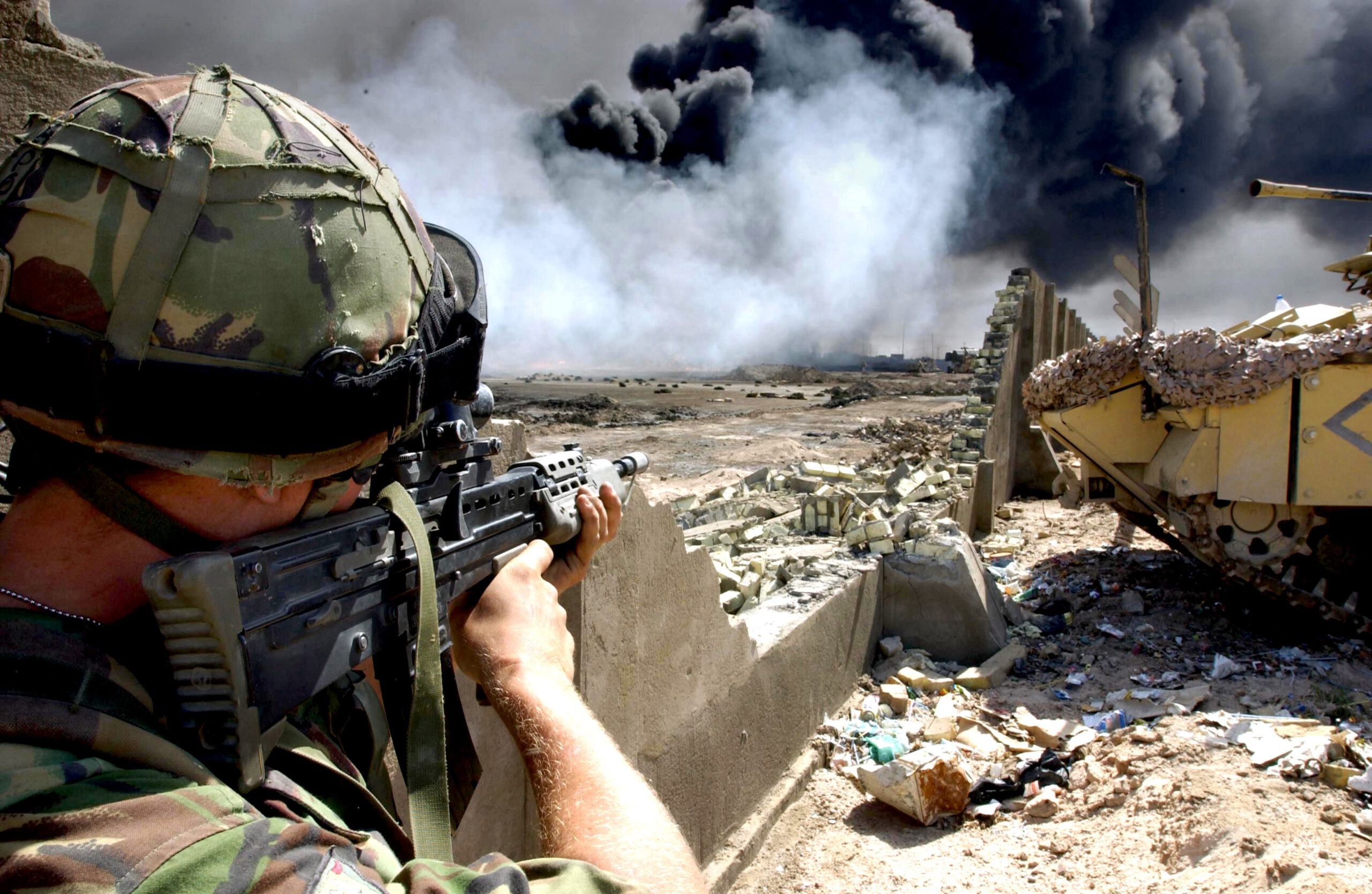
April 3, 2003: A British soldier covers sappers capping a burning oil well in Basra. (WO2 Giles Penfound/MOD, Wikimedia Commons)
By Matt Kennard
Declassified U.K.
- BP returned to Iraq in 2009 after a 35-year absence and was awarded a significant interest in the country’s largest oil field near British-occupied Basra
- BP has pumped 262 million barrels of Iraqi oil since 2011
- Sir John Sawers, the U.K.’s first special representative to Iraq after invasion, has banked £1.1m since joining BP’s board in 2015
- Other U.K. oil “supermajor” Shell also won Iraq contract in 2009 as lead operator developing “super-giant” Majnoon oil field
 BP has pumped oil worth £15.4bn in Iraq since 2011 when it began production in the country for the first time in nearly four decades, new analysis shows.
BP has pumped oil worth £15.4bn in Iraq since 2011 when it began production in the country for the first time in nearly four decades, new analysis shows.
The new information came on the 20-year anniversary of the beginning of the invasion of Iraq, which was judged to be illegal by the U.N. However, neither U.S. President George W. Bush nor British Prime Minister Tony Blair, the leaders who prosecuted the war, have been subjects of a criminal investigation.
[Related: How Team Bush Escaped Justice Over Iraq]
The invasion began in March 2003 and unleashed a catastrophic humanitarian disaster with an estimated 655,000 Iraqis killed in the first three years of conflict, or 2.5 percent of the population.
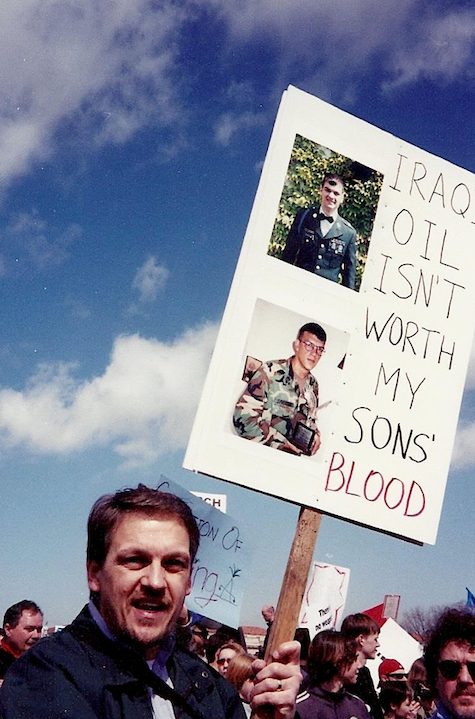
March 15, 2003: “With two sons in the army, I am demonstrating in Washington, D.C., four days before the invasion.” (Larry Syverson/Flickr, CC BY-SA 2.0)
It was widely denounced as a war-for-oil on the part of the U.S. and U.K. Iraq holds the world’s fifth largest proven oil reserves. Iraq had no connection to the Sept. 11th terrorist attacks which had taken place 18 months before and initiated the so-called War on Terror.
The data on BP’s post-invasion production in Iraq comes from the company’s annual reports and was calculated using the average annual price for a barrel of oil for each year of production.
From 2011-22, BP pumped 262 million barrels of Iraqi oil.
The company started producing 31,000 barrels of Iraqi oil a day in 2011, but that number had increased rapidly to 123,000 barrels a day by 2015.
By 2020, BP produced more oil from Iraq than its whole European operation, including Britain’s North Sea.
In the months preceding the 2003 invasion, BP had been dubbed “Blair Petroleum” due to the British prime minister’s intensive lobbying on behalf of the company.
Both BP and Shell have histories in Iraq going back a century, and the country’s oil industry was to a significant extent dominated by the two British companies throughout much of the 20th century.
The Iraq Petroleum Company, which had a virtual monopoly on the country’s oil production in the four decades up to the 1960s, was headquartered in Oxford Street in London. BP and Shell together owned 48 percent, before it was nationalised in 1972 and its concessions expropriated.
‘Accessing Resources’
But BP returned to Iraq for the first time since the 1970s six years after the British invasion. “We continually seek to access resources and in 2009 this included Iraq,” the company stated at the time.
The new opportunity was a contract won from a state-owned company to expand production from the Rumaila field near Basra, one of the largest oil fields in the world. The British Army was at the time occupying Basra and surrounding areas in southern Iraq.
The Rumaila field, which extends 50 miles from end to end, had originally been “discovered” by BP in 1953 and is the largest in Iraq.
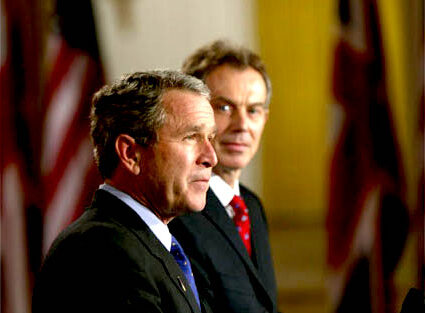
Jan. 31, 2003: U.S. President George W. Bush and U.K. Prime Minister Tony Blair addressing the media after privately discussing plans to invade Iraq. (White House/Paul Morse, Public domain, Wikimedia Commons)
The initial Bush administration plan was for the Iraqi government to sign a new oil law which would have indirectly privatised Iraq’s oil through an unconventional type of contracting called “production sharing agreements” (PSA).
These would have allowed foreign oil companies to sign contracts with the government to develop specific areas of Iraq’s petroleum sector in exchange for a share of the oil profits.
But the Iraqi constitution requires the Parliament to ratify laws, and because of the internal dynamics in the country at the time the Parliament ended up being controlled by nationalist parties with anti-occupation politics.
The Iraqi government had to revert to an older law that only allows for “technical service contracts” (TSC) which kept the oil under Iraqi ownership while giving foreign oil companies a flat rate in exchange for services.
BP’s investment in Rumaila took the form of a TSC, which became effective in December 2009. In the deal BP would recover costs, irrespective of oil price, and get a fee per barrel of production above a defined threshold.
However, the company reported “the technical service contract (TSC) under which we operate in Iraq functions as a PSA [production sharing agreement].”
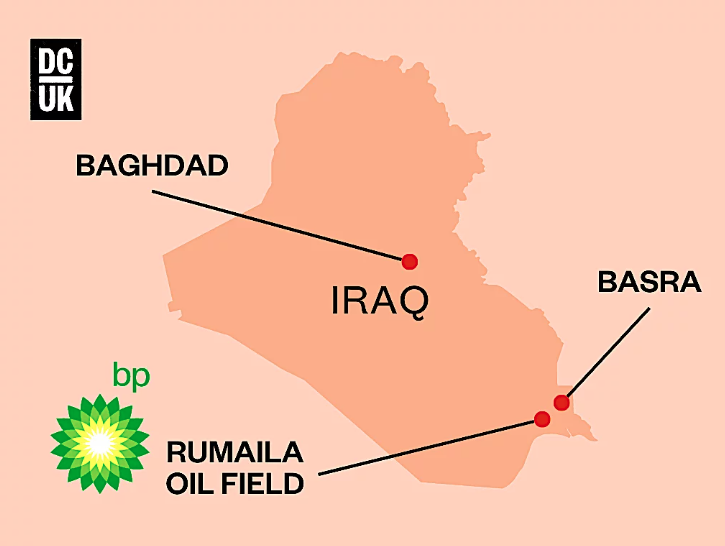
‘Lead Contractor’
BP was the lead contractor on the Rumaila development, with a 38 percent working interest. The China National Petroleum Company (CNPC) held 37 percent with the remaining 25 percent held by the Iraqi government.
BP said, alongside CNPC, it intended to invest $15 billion over the next 20 years to increase production in Rumaila to nearly 3 million barrels per day, or 3 percent of global oil production.
At the time, Rumaila already produced half of Iraq’s oil exports and comprised five producing reservoirs. BP together with its partners would refurbish the wells and facilities.
In its first year of operation, BP increased production from the Rumaila field by 10 percent above the rate initially agreed with the Iraqi oil ministry, meaning the company became eligible for a share of the oil produced. Over the following decade, BP would extract an average of 65,000 barrels of oil a day from Rumaila.
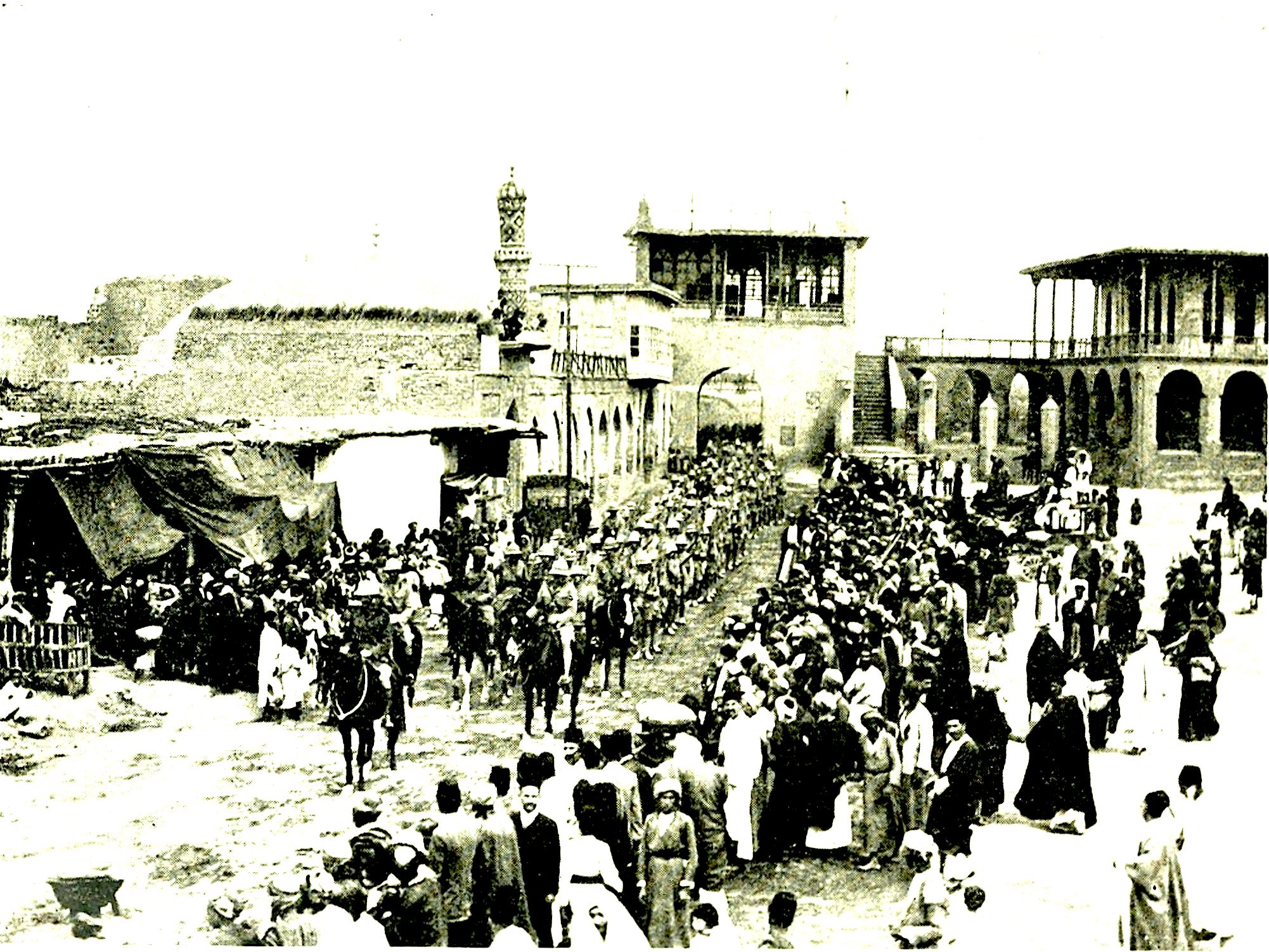
March 11, 1917: British troops entering Baghdad. (Public domain, Wikimedia Commons)
In 2014, BP increased its working interest in the Rumaila TSC to 48 percent and the contract was extended by five years to 2034.
“Despite instability and sectarian violence in the north and west of the country, BP operations are continuing in the south,” the company reported.
In 2015, it reported that “we continue to build relationships in BP’s historic heartlands of the Middle East, with growing opportunities” including in Iraq, where BP production hit a high of 123,000 barrels a day. Iraq was now designated one of BP’s “principal areas of production.”
Special Representative to Iraq
One figure who has done well out of BP is Sir John Sawers, the U.K.’s first special representative to Iraq in 2003, who joined the company’s board in 2015.
Over the following seven years, Sawers has earnt £1.1 million in fees from the company. His BP shareholding was also worth £135,000 last year, up 181 percent from when he joined the company.
Sawers joined BP as a non-executive director in May 2015 having apparently been “identified” the previous year as he stepped down as head of MI6, Britain’s external intelligence agency.
“John brings long experience of international politics and security that are so important to our business,” the company reported. Sawers spent the bulk of his career in diplomacy “representing the British government around the world,” BP added. Owing to this experience, BP made Sawers chair of its Geopolitical Committee.
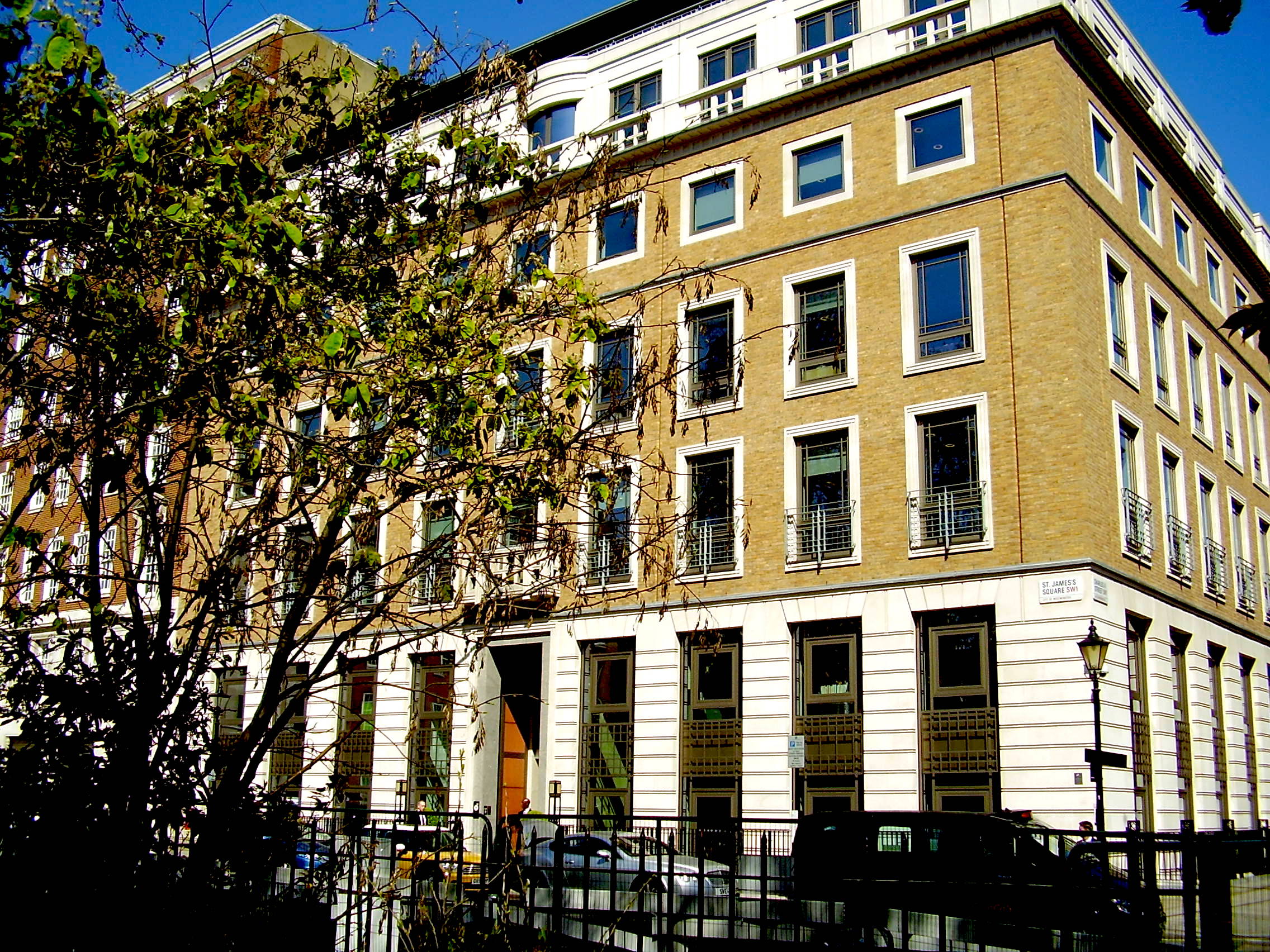
The head office of BP in London. (WhisperToMe, Public domain, Wikimedia Commons)
Sawers was close to Prime Minister Tony Blair in the period around the invasion of Iraq, serving as his foreign policy adviser from 1999-2001. In May 2003, Blair appointed Sawers Britain’s first special representative to post-invasion Iraq.
The role of the special representative was “to work with Iraqis, with Coalition partners and with other representatives of the international community to help and guide the political processes leading to the establishment of an interim administration.”
Sawers then became political director and main board member of the Foreign Office from 2003-07. His influence in Iraq continued as he returned to the country representing the British government in October 2005 in the aftermath of the successful constitutional referendum.
Close to MI6
It appears Sawers had been an MI6 officer earlier in his career. In 2009, when he was appointed head of MI6, the BBC commented: “As Downing Street coyly noted, Sir John is ‘rejoining’ the SIS [Secret Intelligence Service] – no details were given about his previous career in MI6.”
BP has long been close to MI6. In a 2007 Mail on Sunday article, which was subsequently taken down, a company whistleblower claimed “BP was working closely with MI6 at the highest levels to help it to win business … and influence the political complexion of governments.”
Renegade former MI6 officer Richard Tomlinson wrote in his 2001 memoir that BP has “MI6 liaison officers who receive relevant CX [intelligence]”.
Sawers’ predecessor as head of MI6, Sir John Scarlett, was the senior intelligence official responsible for Tony Blair’s notorious dossier on Iraq’s weapons of mass destruction produced in the run-up to the invasion. Scarlett “proposed using the document to mislead the public about the significance of Iraq’s banned weapons.”
Under his relevant skills section, BP reported Sawers’ “management of reform at MI6 also complements BP’s focus on value and simplification.”
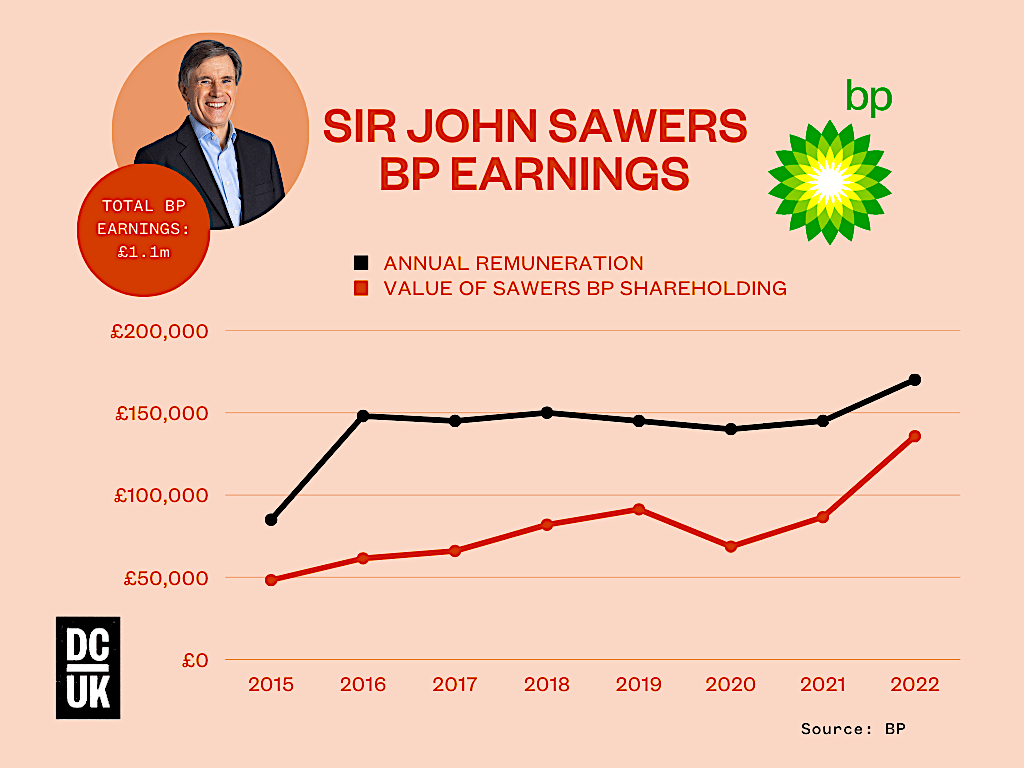
Shell’s Super Giant Oil Field
The other U.K. “supermajor” oil company, Shell, also re-entered Iraq in 2009 when it “secured an important position” in the country with a government contract for developing the Majnoon field, again close to Basra in British-occupied southern Iraq.
The company described it as “one of the world’s super-giant oil fields” with an estimated 38 billion barrels of oil.
Shell was awarded a 20-year technical services contract as lead operator with a 45 percent interest in developing Majnoon. Malaysian oil company Petronas would hold 30 percent with the Iraqi state holding the remaining 25 percent.
Production was expected to reach 1.8 million barrels of oil a day, Shell said, up from the 45,000 it was producing at the time. Shell also said the field had “additional exploration potential.”
Also in 2009, Shell was awarded a 15 percent share in a contract for the development of the West Qurna 1 field — again near Basra — as part of an ExxonMobil-led consortium.
This contract was renegotiated in 2014 and the government share was reduced from 25 percent to 5 percent and dispersed to other shareholders, including Shell.
However, in 2018, Shell sold out its now 20 percent interest in the West Qurna 1 field, and its 45 percent interest in Majnoon field, to the Iraqi government.
BP and Sir John Sawers did not respond to requests for comment.
Matt Kennard is chief investigator at Declassified UK. He was a fellow and then director at the Centre for Investigative Journalism in london. Follow him on twitter @kennardmatt
This article is from Declassified UK.

US and UK installed and supported Saddam Hussein to be a puppet and an attack dog against Iran, and when he was not a good dog anymore, the US decided to obliterate the nation, murder everyone and take what they wanted anyway. It was brutal. Still is. DU rounds are still causing problems and will be for generations.
This is a pattern of behavior from the US Empire as it is. The sales-pitch narrative crafted for the Western consumer is very different.
The spice must flow. The oil must flow. If the empire cannot control the spice/oil, they will not collect revenue from the lesser peoples’ nations. They will not control the energy supplies of the competition, and they will be revealed as the proverbial naked emperor, without clothes.
That would be unacceptable, and Churchill would be a sad ghost, same as the Rockefellers and the Bushs, the Fords and the Kagans.
So, mass murder it is then. And again and again.
Western capital always finds a way to parasitize the natural resources in the undeveloped world, even more so when the spilling of blood has been a part of the process. First the locals are deprived of life and liberty in wars ginned up specifically to enable the wholesale thefts meant to benefit the invaders, then they are swindled of whatever national treasures may lie within their national soil, sediment, strata, aquifers, waterways, coasts, littoral zones or farm fields. What’s astounding is that the Western pirates cannot even balance the books on their own economies or meet the needs of their own people even with all their ill-gotten goods. In spite of all the plunder which reduces the standard of living in the resource-rich target countries, thieves and meddlers like the US, the UK and the EU are still on the precipice of economic collapse, or so they tell their own victimized working classes. Don’t expect me to cry for you, BP.
The Western ‘values’ on display…What hypocrisy. It wasn’t about Hussein, it was about the oil to be stolen. And so it goes with every nation on this planet – if rich in natural resources, in danger of being trampled on by the US and ilk.
@Valerie
the article is also on Caitlin’s substack:
hxxxps://caitlinjohnstone.substack.com/p/john-boltons-prominence-in-the-media
That worked. Thankyou Kooka.
And the asset stripping of the ME continues as the USA and friends continue to steal Syrian Oil.
And if the Syrians try to protect themselves from the invaders, then they will be bombed. Ain’t democracy great ?
hxxps://www.bbc.com/news/world-middle-east-65061880
Indeed – It was not just Iraq that got raped and pillaged. Libya’s central bank was looted of its gold (recall Gaddafi’s “gold Dinar”) and oil assets. Even countries not bombed into the Stone Age, are getting looted: Venezuela has had many billions stolen, as well as Iran and Russia. Plus, 100s of thousands of innocent people have been killed or died as a direct result of these atrocities.
Perfectly written, Peter. Yet the vast majority, it seems, continue to “thank a soldier,” “support our troops,” and accept the idea that the military is a good and noble organization. Isn’t the Marine Corps’ “Toys for Tots” the most egregious example of this? It suggests that an arm of Murder, Inc. is actually a benign organization. The Corps is provides little children with playthings and that’s so sweet. Of course, we’re talking about American children, the only ones worthy of such kindliness; the tots overseas we slaughter.
In plain English the BRITS STOLE OIL from the Iraqi people in the amount of $ 15 BN. But as COLONISTS England NEVER saw themselves as THIEVES bringinging POVERTY to the Iraqi people!!
The first thing that happened after we strung up Saddam was we declared the prior contracts nul & void. We instantly said to the Chinese, whose contract WAS CSIGNED was to turnaround and give them the same contract terms for 3 billion dollars. An American oil company pocketed the proceeds. The rest was doled out to BP, Total and our friends, the Russians, all for modest billions.
British and American oil companies have been taking Iraqi oil for decades. The real reason for starting the Iraq war was that Hussein began negotiations with China to develop new oil fields in Iraq.
I also remember something about Hussein wanting to sell oil in euros instead of US dollars – the same reason Gaddafi was killed.
Wars in the Middle East were for “The Greater Israel Project”.
This is correct. Israel got 3/4 of its oil from Iraq at a very cheap price after the invasion. Paul Wolfowitz reversed a president’s cabinet decision not to target oil infrastructure right before the invasion of Iraq and did so in order to target oil infrastructure in Syria. Israel was paying a massive premium on oil and used the invasion of Iraq as a means to re-open the Haifa pipeline. They made the stupid mistake of publishing about this in their papers and when Iraqi’s got wind that America was going to siphon off their oil to Israel they began attacking and sabotaging their own oil infrastructure. Israeli eagerness to open that pipeline backup and pre-announcing it effectively ruined that plan. In the end they still got the oil they needed just not through their first plan. China was the second greatest benefactor of exporting iraqi oil.
The country that lobbied for, planned, and used USA military to destroy syrian oil infrastructure and then steal Iraqi oil, of course, wasn’t the USA. It was neocons and Israel. It was only a cherry on top for Greater Israel plans, but somehow the main planner and perpetrator in stealing Iraqi oil never gets mentioned.
For those that think that these colonial wars were fought simply for economic gains, not first and foremost to maintain or expand the Anglo-American Empire’s geopolitical goals against any potential adversary, consider the following: By the end of 2022 the War in Iraq alone will have cost the United States $1.922 trillion and counting, while for the UK, a much smaller “investment” of less than $7 billion was necessary.
And yet soon it will all be coming apart, as peace and stability looms, as China mediates a rapprochement between the Saudis and Iran , while the Russians do likewise between Syria and Turkiye.
hxxps://www.lewrockwell.com/2023/03/no_author/john-boltons-prominence-in-the-media-proves-our-entire-society-is-diseased/
Lengthy article by Caitlin Johnston on the whitewash of the Iraq crime: it is scathing,on point and raises the question as to why these criminals are still walking free and getting extensive media coverage.
Answer to the question is america does not do accountability, witness the Ukrainian policy crime.
The Lew Rockwell website is very interesting, but i couldn’t find the specific article you posted in your link. (It only took me to a listing of L. Rockwell website)
It is interesting to think back to the pro-war rhetoric of the beginning of the century. The Iraqi invasion was going to pay for itself, because of the oil. It was worth invading Iraq because of the wealth of its oil resources. We were told this in various ways at the times.
It is worth remembering because it reflects on what is really meant when words like ‘we’ and ‘national interests’ are used.
In the USA, it has been estimated that ‘we’ the people have paid or will pay in taxpayer money about $2.5 trillion for this war, by the time all the veteran benefits are paid out. We also paid with something like at least 5000 lives of sentient souls, and many times this wounded in various physical and mental ways. with both likely under-counted in statistics and reports.
Did you get a check of your share of Iraq War Profits? Did you pay for your kids college when that $10k lump sum check arrived in the mail from ‘your’ government after its profitable war adventure? Nope, not as just a taxpaying citizen. You got stuck with the bills, and none of the profits flowed your way. In fact, you paid for it in other ways as domestic spending shrinks and services the government provides to its citizens become rarer, all while funding a ‘defense’ budget that soars to new records every year.
But, some people did profit. This oil company raked in money, as shown in this article. And this is just one example. If you are in the class of people who own many shares of Shell Oil, then you got some of the profits.
Just remember this …. when they are talking about ‘we’ in a war, if you are just an ordinary taxpayer, that means you do the dying and the killing, and you pay the taxes. But the ‘we’ that benefits is another group of people. The same people who benefit from ‘the national interests’ when all you do is get the bill for the expenses.
How is the current war for ‘democracy and freedom’ doing at giving you more democracy and freedom in your life? Or will that end up like the oil profits from the Iraq war which never quite trickled all the way down to you?
Hello Peter, are you the same peter who wrote “Practical Ethics”?
It is a uni text on my shelf. Maybe you just liked the name as a handle…
Iraq is a victim of crime, proven, and now the profiteers which pushed for war and profited from it, are not going to pay reparations.
That would hurt the empire, and force the empire to admit failure, or wrongdoing.
That won’t be allowed to be a thing. A door for legal compensation for victims of crime would be opened. The profit is already spent. The corporate world will simply pass the bill to the poor, by inflating prices.
Lets remember that when slavery ended the slave owners were compensated, not the slaves. We now have a mere extension of that same system.